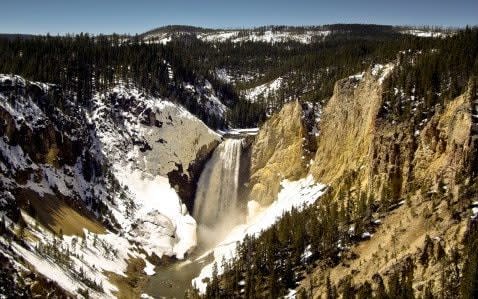Judge overules Trump as Yellowstone grizzly bears offered protection from trophy hunts

Judges in the US ordered protections to be restored to grizzlies in and around Yellowstone National Park, halting plans for the first licensed trophy hunts of the bears in the region in more than 40 years.
US District Judge Dana Christensen in Missoula, Montana, sided with environmentalists and native American groups by overruling the President Donald Trump's decision to strip the grizzlies of their status as a threatened species.
The outcome caps one of the most high-profile legal battles over the Endangered Species Act, rivaling previous disputes surrounding the gray wolf and northern spotted owl.
The ruling came as the Trump administration is seeking to rewrite regulations that scientists say would erode wildlife protection for the benefit of commercial interests.
The Trump administration's decision in June of last year to "de-list" the grizzly, formally proposed in 2016 during the Obama era, was based on agency findings that the bears' numbers had rebounded enough in recent decades that federal safeguards were no longer necessary.

The de-listing, welcomed by big-game hunters and cattlemen, had applied to about 700 Yellowstone-area grizzlies in Wyoming, Idaho and Montana.
Environmentalists countered that treating those bears separately from other grizzly populations in Montana and elsewhere in the Lower 48 states was biologically unsound and illegal under the Endangered Species Act, and the judge agreed.
Grizzlies, which are slow to reproduce, number fewer than 2,000 bears across the Lower 48. That is far below an historic high of 100,000 before widespread shooting, poisoning and trapping reduced the bears' population to just several hundred by 1975, when they were placed under federal protection.
Environmentalists have said that while grizzlies have made a comeback, their recovery could falter without continued federal safeguards. They point to, among other things, alterations in the bears' food supply from climate change and high levels of human-caused mortality.
Native American tribes, which revere the grizzly as sacred, sought reinstatement of its threatened status as essential to protecting their religious practices.
Ranchers, who make up a powerful political constituency in Western states, have strongly advocated de-listing grizzlies, arguing the bears' growing numbers pose a threat to humans and livestock. Agitation for state management of the bears also came from hunters, who highly prize them as trophy animals.
The judge said he discounted such factors.

 Yahoo News
Yahoo News 
